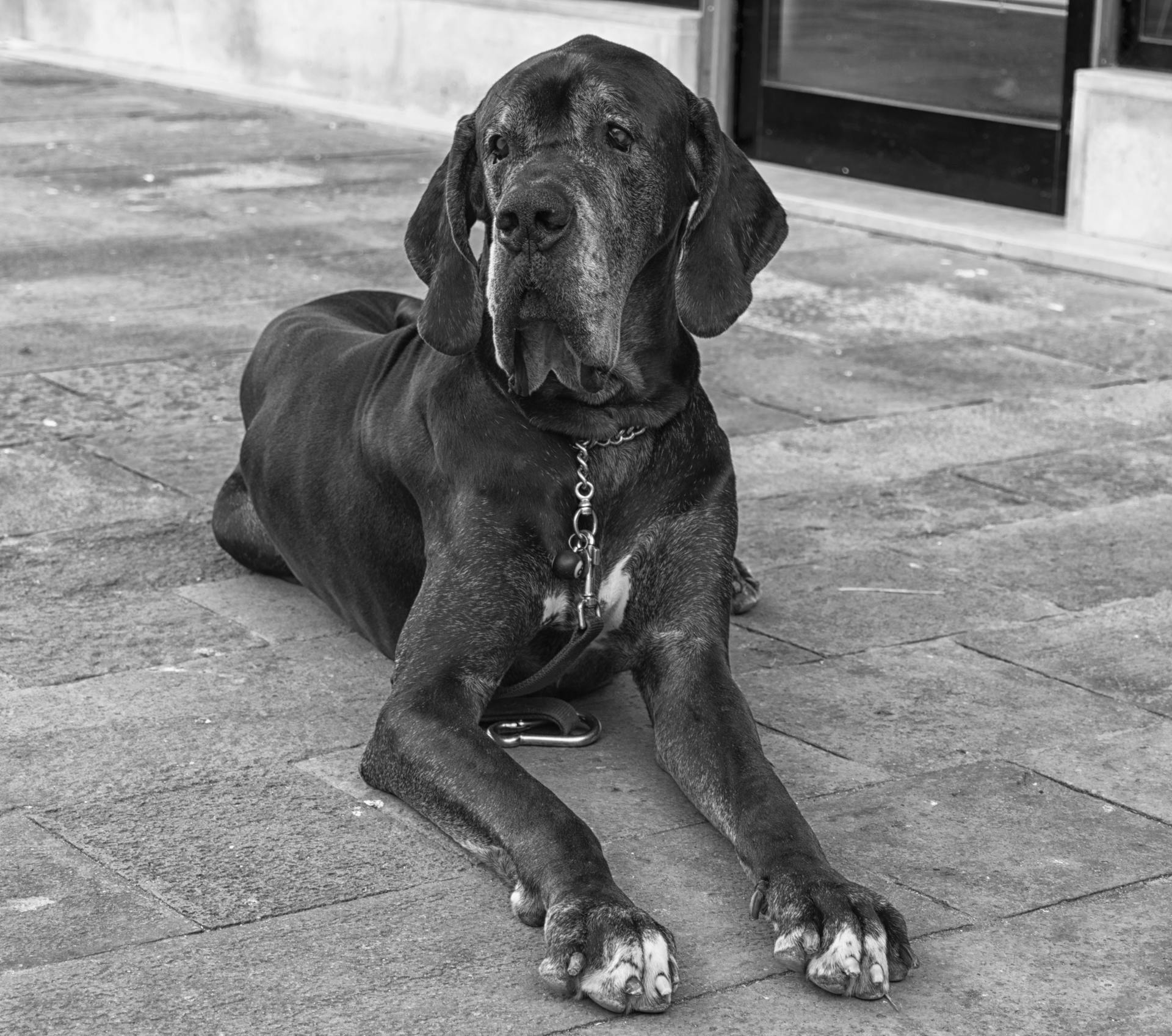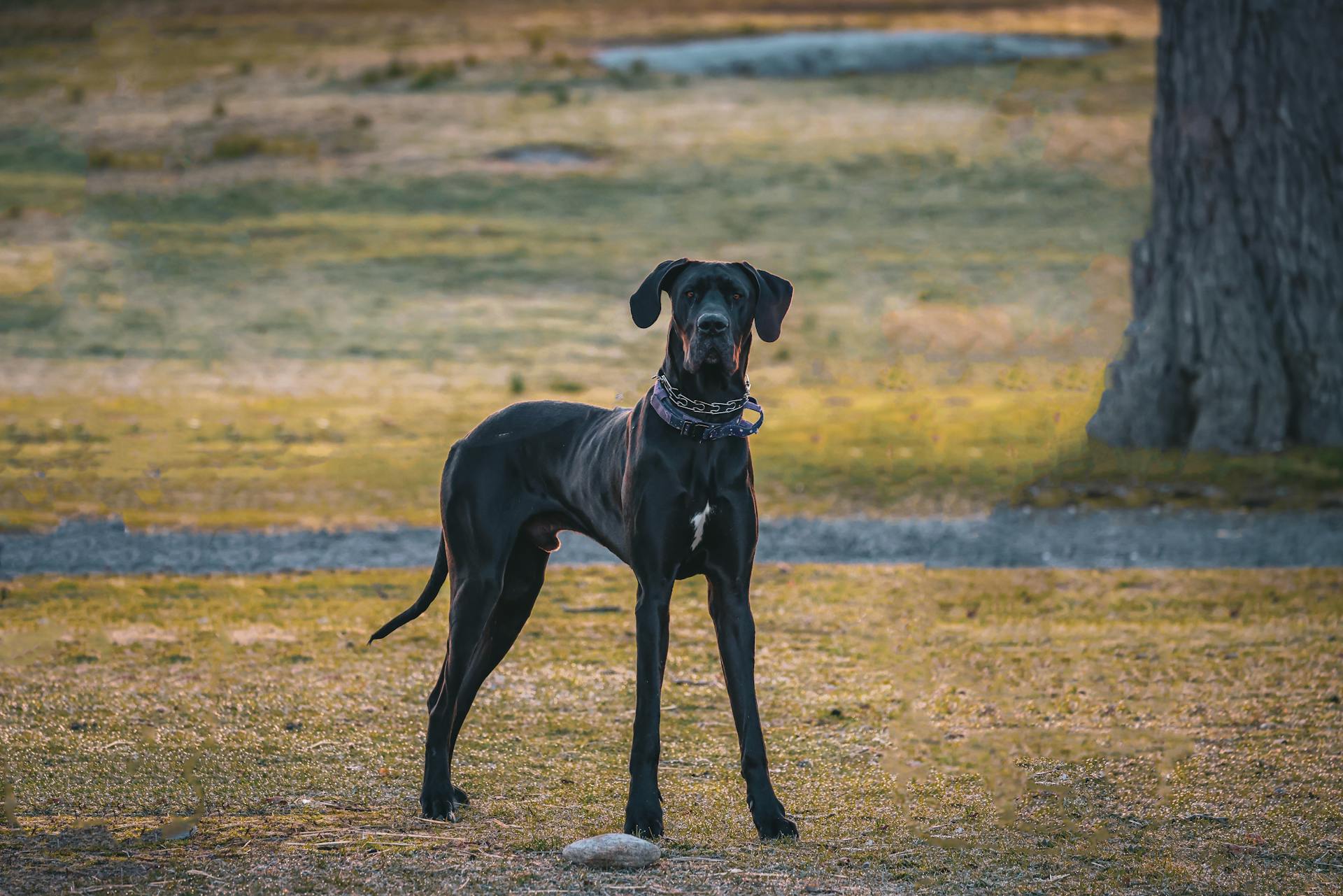
Great Danes are a beloved breed, but their large size and unique characteristics require special care. On average, a Great Dane's lifespan is 6-8 years.
Their massive size can lead to joint problems, which can be a major health concern. According to the American Kennel Club, Great Danes are prone to hip dysplasia and elbow dysplasia.
Proper diet and exercise are crucial for maintaining a Great Dane's health. A Great Dane's daily calorie needs can range from 4-6 cups of food, depending on their age and activity level.
Regular veterinary check-ups can help identify any potential health issues early on.
For more insights, see: Great Dane Dog Health Problems
Factors Affecting Lifespan
The lifespan of a Great Dane is influenced by a variety of factors that go beyond the dog itself.
Factors such as environment and lifestyle play a significant role in determining how long a Great Dane will live.
Not all of these factors are under your control, but being aware of them can help you create a healthy and happy environment for your dog.
Surrounding conditions come together to create a perfect storm that will determine how long or short a Great Dane's life will be.
Great Danes are susceptible to certain health conditions that can impact their lifespan, so it's essential to learn about these before bringing one home.
Pet insurance can offset future medical emergency costs, which can add up quickly with this breed.
Common Health Problems
Great Danes are prone to a range of health issues that can impact their lifespan. As a responsible owner, it's essential to be aware of these potential problems.
One of the most significant health concerns for Great Danes is bone and joint issues, such as osteochondritis dissecans (OCD), eosinophilic panosteitis (pano), and hip and elbow dysplasia. These conditions can cause pain, arthritis, and even paralysis if left untreated.
Great Danes are also at risk for eye problems, including inherited conditions that can lead to blindness if not treated promptly. Regular eye exams are crucial to detect any issues early on.
Here's a breakdown of some common health issues affecting Great Danes:
By understanding these potential health issues, you can take proactive steps to ensure your Great Dane lives a long, happy, and healthy life.
Dental Disease
Dental disease is a common and serious health issue that can affect your dog's overall well-being. Almost 80% of canines will develop some form of dental disease unless they receive regular dental care.
Brushing your dog's teeth can be challenging, especially for larger breeds like Great Danes. Tartar buildup can lead to infections in the gums and teeth, which can damage internal organs like the liver, heart, and kidneys.
Regular dental care is crucial to prevent dental disease, and it's estimated that dental disease can take one to three years off a Great Dane's life expectancy. This is a significant concern, and it's essential to prioritize your dog's oral health.
Dental disease starts with tartar build-up on the teeth and progresses to infection of the gums and roots of the teeth. If left untreated, it can lead to tooth loss and damage to vital organs.
Great Danes are more likely than other breeds to develop dental disease, and it's essential to work with your veterinarian to develop a dental care plan. Regular cleanings and at-home care can help prevent dental disease and keep your dog's teeth healthy.
Bone Problems
Great Danes are prone to a number of bone problems that can be painful and debilitating. One of the most common issues is osteochondritis dissecans, or OCD, which occurs when the cartilage in a joint doesn't attach properly to the bone.
This can happen if a Great Dane grows too quickly, so it's essential to monitor their growth rate. Our recommended growth rate is no more than four pounds per week. To maintain this rate, don't overfeed your Great Dane and avoid supplementing with additional calcium.
Feeding a large-breed puppy diet rather than an adult or regular puppy diet can also help. And, be sure to weigh your puppy every three to four weeks to ensure they're on track.
Some other bone problems that can affect Great Danes include eosinophilic panosteitis, or pano, which is a painful inflammation of the long bones in the legs. This condition usually starts around six to ten months of age and can cause lameness.
Dysplasia, an inherited disease that causes the joints to develop improperly, is another issue that can lead to arthritis and joint pain. This can cause stiffness and discomfort, especially as your Great Dane matures.
Here are some common bone problems that can affect Great Danes, along with some tips for prevention and treatment:
- Osteochondritis dissecans (OCD): caused by rapid growth, can be treated with surgery
- Eosinophilic panosteitis (pano): painful inflammation of the long bones, usually starts around 6-10 months of age
- Dysplasia: inherited disease causing improper joint development, can lead to arthritis and joint pain
By being aware of these potential bone problems and taking steps to prevent them, you can help keep your Great Dane happy and healthy for years to come.
Health Factors
Genetics play a significant role in determining a Great Dane's lifespan, with family history being a major factor. If there are health concerns that have plagued past generations, your dog will likely suffer from the same issues.
Cardiac conditions are a major health concern for Great Danes, with their large hearts putting them at risk for heart disease, including cardiomyopathy or DCM. Canines with this condition have enlarged, weak hearts that can't pump enough blood to support their large bodies.
Pet insurance is a good idea for Great Dane owners, as it can offset future medical emergency costs, which can add up quickly with this breed.
Health Factors That Impact

Great Danes are a delicate breed, prone to several health issues that can impact their lifespan. Genetics play a significant role in determining their overall health and lifespan.
Family history and the quality of their bloodline can impact their lifespan. Mixed-breed dogs have been shown to live longer than purebreds.
Bloat is a serious health issue that can be fatal if not treated immediately. It occurs when the stomach twists and gas buildup causes the organ to swell.
Great Danes are especially prone to a life-threatening heart condition known as dilated cardiomyopathy, or DCM. As this problem advances, your pet may act weak or tired, faint or collapse, breathe in a labored way, or cough.
Pet insurance is a good idea, as it can offset future medical emergency costs, which can add up quickly with this breed.
Size
Their large size is undoubtedly one of the main contributing factors to orthopedic problems in Great Danes. The math is simple—the more weight a dog has to carry around, the greater the strain on its joints and bones.
Great Danes' dominant size is linked to their muscle mass, which is one of the reasons why they have a shorter life expectancy than other breeds. This is because their large size puts extra pressure on their joints and bones.
In contrast, crossbreeds like the Great Danoodle, which combines the Great Dane with the Standard Poodle, can live up to 13 years on average. This is much longer than a Great Dane's life expectancy.
Their imposing size and muscular build make Great Danes some of the best guard dogs for families. They're fierce protectors and will do whatever it takes to keep their loved ones safe.
Related reading: Puggle Age Expectancy
Joint Disease
Joint disease is a common issue in larger breeds, particularly in Great Danes. Their size and muscle mass put a lot of strain on their joints, leading to problems like arthritis and hip dysplasia.
Elbow and hip dysplasia are two common joint issues that affect Great Danes. These conditions are caused by abnormal development of the joints, resulting in cartilage loss and joint deformities.
Wobbler disease is another condition that affects the vertebrae and can cause paralysis. It's a serious issue that requires veterinary attention.
Supplements containing glucosamine and chondroitin can help alleviate the pain and inflammation associated with joint disease. Your vet may recommend these supplements to help manage your dog's joint health.
Joint disease can impact a dog's long-term ability to exercise and stay healthy, influencing how long they live.
Expand your knowledge: Lifespan of Dog with Kidney Disease
Care and Lifestyle
Caring for a Great Dane is a big responsibility, but with the right approach, you can help your furry friend live a long and healthy life. To start, make sure your dog gets high-quality nutrition, the right amount of exercise, and plenty of rest.
A Great Dane's diet is crucial, and they need special food that meets their nutritional needs at every stage of life. As they age, their care needs change, and they may require different food, such as weight management or low-sodium diets.
Worth a look: Welsh Terrier Life Expectancy
Dogs with separation anxiety or stress may be less healthy, which can impact their lifespan. Providing a low-stress environment and regular preventative medical care can help prevent health issues.
Great Danes need plenty of space to move around and get exercise. They require at least an hour of interactive play or walking each day, and their owners should have a plan in case they need to take their dog to the vet in an emergency.
Here are some key factors to consider when caring for a Great Dane:
- Provide high-quality nutrition and special diets as needed
- Ensure regular preventative medical care
- Offer plenty of space and exercise
- Create a low-stress environment
- Be mindful of your dog's changing needs as they age
- Consider pet health insurance to cover medical costs
By following these guidelines, you can help your Great Dane live a happy, healthy life.
Understanding Lifespan
Great Danes have a relatively short lifespan, typically ranging from 7 to 10 years. Most live for about 6 and a half years on average.
Larger canines like Great Danes grow and age faster than smaller breeds, which can impact their lifespan. This is due to their rapid growth rate and increased susceptibility to health issues.
The longest-living Great Dane on record was Maggie Mae, who nearly reached 16 years of age. However, this is not a typical lifespan for the breed.
Care, lifestyle, exercise, and nutrition can all impact an individual Great Dane's health and life expectancy.
Key Considerations
If you're considering bringing a Great Dane into your life, be prepared for a potentially bittersweet experience - they're often referred to as the "heartbreak breed".
Their lifespan can be shortened by many health problems, but with proper care and attention, they can still live a loyal and loving companion for 7-10 years on average.
You'll need to be vigilant about monitoring your Great Dane's health and watch for any abnormal symptoms that could be a sign of serious disease.
Many diseases in Great Danes cause a characteristic combination of symptoms, making it easier to tell when they need veterinary help.
It's essential to know when to seek help and how urgently, so you can provide the best possible care for your furry friend.
Frequently Asked Questions
What is the most common cause of death for a Great Dane?
The most common cause of death for a Great Dane is Bloat, which can lead to a life-threatening condition called gastric dilatation volvulus. Understanding this risk is crucial for Great Dane owners to take preventative measures and ensure their pet's health.
How to extend Great Dane life?
To extend the life of your Great Dane, prioritize regular exercise, a balanced diet, and annual veterinary check-ups, while also choosing a reputable breeder to minimize inherited health risks. By following these simple steps, you can help your Great Dane live a long and healthy life.
Featured Images: pexels.com
